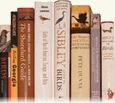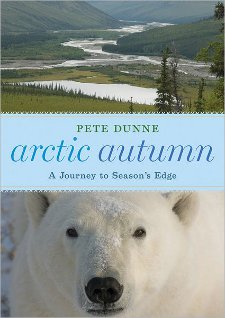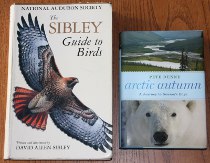Reviewed by Grant McCreary on February 3rd, 2012.
This could have been my easiest, shortest review yet:
Arctic Autumn is the latest book from Pete Dunne. You should read it.
I wouldn’t even have to read the book! But, while true, I suppose that wouldn’t be a very satisfactory book review. And I did really want to read it. So here’s a bit more…
Arctic Autumn: A Journey to Season’s Edge is the latest book in Pete Dunne’s exploration of the seasons and place. It follows Prairie Spring and Bayshore Summer, but these books can be read in any order.
The story opens on Bylot Island in Nunavut, Canada, on the summer solstice. Yes, as Dunne points out, that is technically the first day of summer, not autumn. But when you’re that far north (see for yourself), “autumn comes early and surrenders quickly”. The journey ends in November finding Dunne and his wife on a Polar Bear photography tour in Churchill, Manitoba.
In between, we join Dunne as he rafts through the Arctic National Wildlife Refuge, attempts to meet up with migrating Caribou, birds St. Lawrence Island, and hunts Caribou. Through these travels, Dunne provides vivid glimpses of the Alaskan and Canadian arctic and its wildlife. This includes birds, of course, but also the mammals that, perhaps even more so, characterize this special place.
But Arctic Autumn is more than “just” about arctic wildlife. It also presents other, mainly human, sides of the arctic and introduces us to people who live there along with their historical and cultural background. It’s sad that a book like this wouldn’t be complete without also looking at the human impact on this not-as-remote-as-it-seems environment. Dunne doesn’t shy away from this, discussing the controversial subjects of oil exploration and climate change. He does this in a remarkably even-handed and practical manner.
Until the last chapter, the book had been good, but something was missing: Dunne had yet to have his “conversation”. If you’ve read the first entries in this series you most certainly know what I’m referring to. Arguably, it works much better in this book, where it frames the perfect conclusion to this chapter in the series. I’d go into more detail, but I think it best if you experience it for yourself. I’ll just include one particular quote that spoke to me. It’s one of the main issues that Dunne seems to be taking on in these books:
Most of the members of my species are too distracted and estranged to recognize, much less care about, the natural endowment that supports them, and the interconnectedness that binds them. Polar bears in the Arctic are far less pertinent than getting the car through inspection, making the monthly mortgage payment, or deciding what color to paint the kitchen.
So how do we break free of our distractions? Explore. As Dunne exhorts: “break with the routine of your life and set off to explore the world beyond your own…” This book, and the series as a whole, makes me want to do just that.
Recommendation
Arctic Autumn may not be the best in this series (for me, it’s still Prairie Spring), but it will inform, entertain, and – hopefully and most importantly – open your eyes a little to the natural world and your role in it.
In other words: Arctic Autumn. Pete Dunne. Read it.
I’m sad to say that this book marks the end of the series; the concluding volume on winter will not be published. (At least from this publisher, although I hope that Dunne can eventually get it published somewhere.) The series, although sadly incomplete, is still very much worth reading. Dunne seeks to instill a passion for nature and an appreciation that we are inextricably connected to it. This is a vital ambition, and I believe that he has successfully done that in this series.
Disclosure: I get a small commission for purchases made through links in this post.
Disclosure: The item reviewed here was a complementary review copy provided by the publisher. But the opinion expressed here is my own, it has not been influenced in any way.





I really enjoyed Arctic Autumn. I thought his discussion of hunting was particularly enlightening.
I did as well. Dunne also discusses, in his wonderful style, hunting in several of the essays in Before the Echo.
This sounds excellent. Thanks for bringing it to my notice